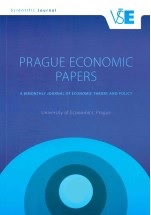Analysis of the Status Quo Behavioural Concept During the Global Economic Crisis
Analysis of the Status Quo Behavioural Concept During the Global Economic Crisis
Author(s): Anton VaskovskyiSubject(s): Social Sciences, Public Finances
Published by: Vysoká škola ekonomická v Praze
Keywords: Behavioural economics; status quo; final consumption expenditure of households; disposable income; public finance; real interest rate; real effective exchange rate; co-integration analysis; ADL model
Summary/Abstract: The objective of this paper is to examine one of the essential behavioural concepts – the ‘status quo bias’ – on the available macroeconomic data. The recent global economic crisis has provided a valuable opportunity for analysing the concept and ensured that relevant and sufficient inputs for such academic research are available. Specifically, to study the ‘status quo bias’, this paper studies the relation between consumption and income before and after the 2008 economic crisis in a selected country. As such, this study attempts to provide answers to such questions as: How strongly is consumption dependent on income prior to and after the crisis? What are the forces behind consumption during the assessed period – income or existing quality of living? What conclusions can be drawn for public finance from the analysis? The findings indicate that the ‘status quo bias’ behavioural concept could be confirmed based on the tested macroeconomic data, and possible implications for public finance are presented as well.
Journal: Prague Economic Papers
- Issue Year: 30/2021
- Issue No: 2
- Page Range: 133-155
- Page Count: 23
- Language: English

